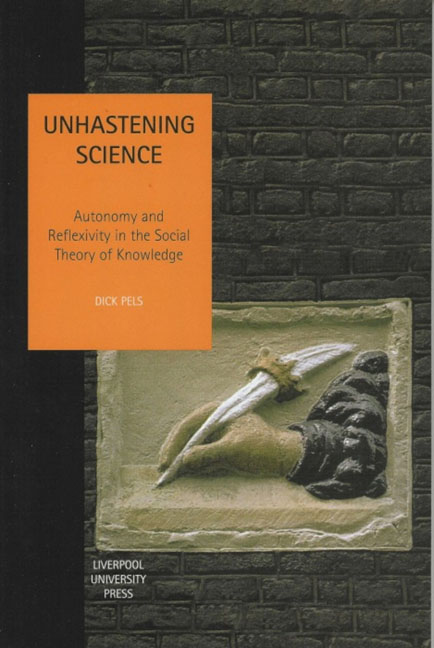Book contents
- Frontmatter
- Dedication
- Contents
- Acknowledgments
- 1 The Timescape of Science
- 2 What (Again) is So Special about Science?
- 3 Two Traditions in the Social Theory of Knowledge
- 4 The Natural Proximity of Facts and Values
- 5 Knowledge Politics and Anti-Politics: Bourdieu on Science and Intellectuals
- 6 The Politics of Symmetry
- 7 Reflexivity: One Step Up
- 8 Intellectual Autonomy and the Politics of Slow Motion
- Epilogue: Weak Social Theory
- Notes
- Bibliography
- Index
8 - Intellectual Autonomy and the Politics of Slow Motion
- Frontmatter
- Dedication
- Contents
- Acknowledgments
- 1 The Timescape of Science
- 2 What (Again) is So Special about Science?
- 3 Two Traditions in the Social Theory of Knowledge
- 4 The Natural Proximity of Facts and Values
- 5 Knowledge Politics and Anti-Politics: Bourdieu on Science and Intellectuals
- 6 The Politics of Symmetry
- 7 Reflexivity: One Step Up
- 8 Intellectual Autonomy and the Politics of Slow Motion
- Epilogue: Weak Social Theory
- Notes
- Bibliography
- Index
Summary
Philosophical Stammering and Monastic Silence
The first aim of this concluding chapter is to provide a broader historical background to the minimalist and pragmatic identification of science that I have attempted so far, in order to deepen the description/justification of its weak autonomy over against other professional pursuits in what I have called the ‘social triangle’. My narrative has repeatedly distinguished between the philosophical (dis)guises of traditional demarcative exercises and the more pragmatic operational conditions that determine the sources of variation and the dynamics of interaction between the professional roles of scientists and politicians. Rather than emphasizing the more conventional spatial dimension of autonomy, I have drawn attention to the peculiar timescape or ‘time flow’ of intellectual work as providing such a minimal touchstone of distinctiveness. In the following, I want to enrich this critical (because anti-essentialist) phenomenology of scientific work by tracing a few lines of genealogical descent of the notion of unhastening (and of the estrangement it both requires and produces), retracing the brittle knowledge-political compromises between the academy and ‘big’ politics that were instrumental in gradually institutionalizing a margin of intellectual autonomy. As an informal history of the temporality of doubt and distanciation, this narrative leads on to a summary of how the various more interesting epistemological principles that we have encountered in this book (such as anti-politics, symmetry, and reflexivity) can be more fruitfully translated as chronopolitical principles of deceleration. After having reclaimed the differential ‘time geography’ of the social triangle, I shall finally outline a new interpretation of academic freedom and of the ‘idea of the university’ that turns the ‘unhastening’ argument into an explicitly normative and political project.
Let me embark upon this episodic genealogy of the times and spaces (the silences and seclusions) of science by recapturing the canonical moment in Western thought that is represented by the Socratic dialogues, which are traditionally identified as the theatre of invention of the philosophical life and the contemplative ethos more generally. In its dialogical form, philosophy is initially invented as a distinctively ‘slow’ manner of speaking. At this historical turn, writing still appears effectively subordinate to both public speaking and private conversation…
- Type
- Chapter
- Information
- Unhastening ScienceAutonomy and Reflexivity in the Social theory of Knowledge, pp. 179 - 216Publisher: Liverpool University PressPrint publication year: 2003



